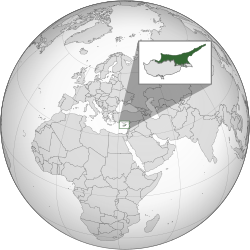 Location of Northern Cyprus (dark green) | |
| Medicinal | Legal |
|---|---|
| Recreational | Illegal |
Cannabis in Northern Cyprus is illegal for recreational use but legal for medical purposes in certain conditions. Marijuana is the most commonly used illicit drug by Turkish Cypriots. [1]